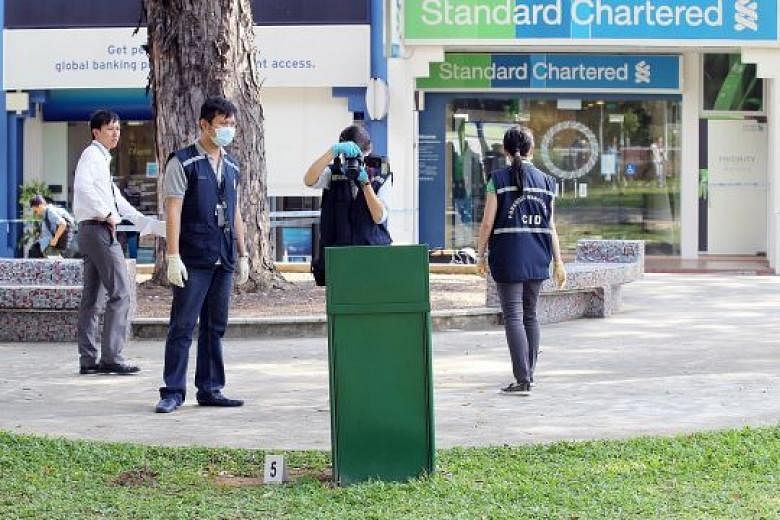The man suspected of robbing a Standard Chartered Bank branch here in 2016 will not be caned even if he is convicted. Singapore is willing to give this assurance to pave the way for the extradition of Canadian David James Roach, 28, from Britain, where he was arrested last month.
The Ministry of Home Affairs (MHA), which is working with the British authorities, said in a statement yesterday: "As part of the extradition proceedings, the UK government has requested an assurance that if Roach were to be found guilty by a Singapore court of robbery, the sentence of corporal punishment will not be carried out."
Singapore has an extradition treaty with Britain, but British laws prohibit the authorities from extraditing Roach without such an assurance. Britain abolished caning as a punishment for criminals in 1948.
"The provision of the assurance is being done to try and ensure that Roach does not escape justice, and does not affect the general position taken by Singapore on corporal punishment," added the MHA.
Roach is accused of robbing StanChart Bank's Holland Village branch of $30,000 on July 7, 2016. He allegedly handed a teller a note with demands. He then fled to Bangkok but was arrested three days later.
He was sentenced to 14 months' jail in Thailand last June for violating money laundering and customs laws. He had carried more than US$20,000 (S$26,000) - believed to be proceeds from the robbery - when he entered Thailand.
Media reports said Roach was being deported from Bangkok to Canada and was in transit in London when he was arrested on Jan 11.
-
Previous extradition case
-
Former financial adviser Michael McCrea was extradited to Singapore in 2005 after the authorities promised Australia that the Briton would not face death if convicted of murder.
He was wanted for the murder of his chauffeur Kho Nai Guan and Mr Kho's girlfriend, Chinese national Lan Ya Ming, in January 2002.McCrea, who was then 44, got three people to clean up the evidence in his Balmoral Park apartment. The bodies were left in his car at the Orchard Towers carpark.
McCrea fled to London and later to Melbourne, where he was arrested in June 2002. He spent the next three years contesting his extradition to Singapore, which Australia eventually allowed.
In Singapore, McCrea was charged with two counts of murder. But these were later reduced to culpable homicide, and he was jailed for 24 years.
The punishment for murder is death or life imprisonment, while that for culpable homicide is life imprisonment and caning, or up to 20 years' jail, with caning or a fine.
His extradition is being sought on one count of robbery under Section 392 of the Penal Code, which can carry a maximum of 10 years' jail and at least six strokes of the cane.
Another count of money laundering is also being sought under Section 47(1)(b) of the Corruption, Drug Trafficking and Other Serious Crimes (Confiscation of Benefits) Act. It carries a maximum sentence of a $500,000 fine or 10 years' jail.
Roach, whose case was heard in a London court last Thursday, said he would contest his extradition. When contacted, Roach's lawyer Sundeep Pankhania declined comment.
Cases where such assurance on punishment is given are "exceptional", and occur when it is "the only means" to secure an extradition, said National University of Singapore law professor A. Kumaralingam. For example, Briton Michael McCrea, wanted for double murder in 2002, was extradited from Australia in 2005 only after Singapore agreed he would not be hanged.The murder charges were downgraded to culpable homicide.
In cases where caning is mandatory, such as robbery, the punishment can be avoided only if the charge is amended to one that does not require such a sentence, said Prof Kumaralingam.
The Constitution also gives the President the power to remit part of the sentence, said Singapore Management University assistant professor of law Eunice Chua.
The Straits Times understands this would mean that even if Roach is to be punished with caning, that part of his sentence can be remitted by the President.
This provision was used in the 1994 case of American teenager Michael Fay, who was caned for vandalising cars and public property. His caning sentence was reduced from six to four strokesin consideration of a request from then United States President Bill Clinton.



